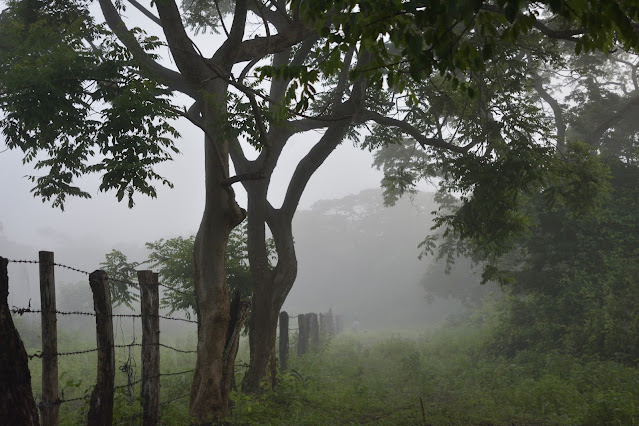Project Houses
 |
| The project's largest ever house in Bagaces, which we rented from 2001 to 2013, with the original Monomobile in the foreground. |
The Lomas Barbudal Biological Reserve is 25 minutes away from the town of Bagaces, where the project headquarters are located. Bagaces is a town of about 10,000 people in Costa Rica’s northwestern Guanacaste province. When Susan first lived there, in 1990, the roads were unpaved, and cattle regularly wandered past the white-washed church in the center of town. Bagaces has grown a lot since then, and there are now several large stores, as well as noisy traffic at night.
We’ve rented several houses in Bagaces over the years, and have also experimented with living on a private ranch closer to the reserve, living in the reserve’s guard station, and camping in the community of San Ramon de Bagaces, just across the Pan-American highway from Lomas.

Hi Dr. Perry,
ReplyDeleteI am taking an excellent course at Washington State University that focuses on the work you have accomplished in regards to the Capuchin monkeys of Lomas Barbudal. I have to say that so far I have found your book to be very enjoyable to read. I find the descriptive narration of what the researchers are feeling, and how they interact with the project and environment while studying the monkeys really adds a very interesting dimension to the book. I also want to say that as a student outside the realm of Anthropology the book is still very accessible, which I appreciate.
Since you have extensive and lengthy experience with the area, have you seen any significant increases in regards to light pollution at night, specifically in the area of your study? I imagine in the time between the beginnings of your research and now numerous more and brighter light sources have been added to the town and the outskirts and I wonder if the introduction of this has had a deleterious impact on the local wildlife?
How wonderful to hear that you are learning about the capuchins in your WSU classes! Who is the instructor? I had fun writing Manipulative Monkeys, and I'm glad you are enjoying it. We have indeed seen a dramatic increase in light pollution over the years. I haven't noticed any dramatic impact of light pollution on the monkeys, but turtle researchers report terrible effects on the species they work with, i.e. it really messes with their ability to breed on the beaches. Ecotourism is a mixed blessing.
DeleteDr. Nicole Hess is the instructor for our course, which is an anthropology course focusing on different primates and their social behaviors. It has been quite fun! Reading your book I noticed that at some point the capuchins would interact with you or the other researchers, such as by making threatening looks and overlord positions, slapping your shoes, and other things. I was wondering if you had an established protocol for the interactions? If a monkey approaches someone are they expected to react in a specific way? Are there set rules for the facial expressions or eye contact you or the researchers need to keep in mind when the capuchin are looking (threatening) directly at you? Have the monkeys ever attempted to urine spray/wash any of the research staff?
DeleteI remember Nicole fondly from her undergraduate days at UCLA, long ago! It is great to hear that she is teaching this course. Regarding your question: it is really critical not to encourage monkeys when they try to interact. We avoid looking them in the eye and never respond to their overtures by making monkey sounds or faces. We just nonchalantly look the other way and perhaps casually move a bit further from them (being careful not to seem like we are intimidated). The goal is for the researchers to be as boring as possible, so the monkeys will not try to incorporate us into their social interactions. They have never tried to urine wash on us, I am happy to say.
Delete